
PHAGE-Therapy Applications and Research
Scope & Guideline
Pioneering Research for a Healthier Tomorrow
Introduction
Aims and Scopes
- Phage Therapy Development:
The journal emphasizes the exploration and development of phage therapy as an alternative treatment for bacterial infections, particularly those caused by multidrug-resistant pathogens. - Isolation and Characterization of Phages:
Research often involves the isolation and detailed characterization of novel bacteriophages, including their genomic analysis, which is crucial for understanding their therapeutic potential and mechanisms of action. - Antimicrobial Resistance Solutions:
A significant focus is on addressing antimicrobial resistance through phage applications, including studies that demonstrate the efficacy of phages against resistant bacterial strains. - Phage Applications in Agriculture and Veterinary Medicine:
The journal highlights the use of phages in agricultural and veterinary contexts, particularly in livestock and poultry, showcasing their role in enhancing food safety and animal health. - Phage Ecology and Evolution:
Research often delves into the ecological roles of phages and their evolutionary dynamics, contributing to a better understanding of their interactions with bacterial hosts. - Innovative Phage Delivery Systems:
The journal explores advancements in phage delivery mechanisms, including formulations that enhance phage stability and efficacy.
Trending and Emerging
- Phage Cocktails and Combination Therapies:
Research on phage cocktails—combinations of multiple phages targeting different bacterial strains—has gained prominence as a strategy to enhance therapeutic efficacy and prevent the development of phage resistance. - Phage Genomics and Bioinformatics:
There is an increasing focus on genomic studies and bioinformatics tools for analyzing phage genomes, which is critical for the identification of new phages and understanding their mechanisms of action. - Clinical Case Studies and Real-World Applications:
The journal has seen a rise in clinical case studies that document the successful use of phage therapy in treating infections, providing valuable insights and evidence for its practical applications. - Innovative Phage Delivery Systems:
New delivery systems for phages, such as encapsulation techniques and novel formulations, are emerging as critical areas of research, aiming to improve the stability and efficacy of phage therapy. - Addressing Specific Pathogens:
There is a notable trend towards targeting specific pathogens of high clinical importance, such as multidrug-resistant strains of Pseudomonas aeruginosa and Klebsiella pneumoniae, reflecting the urgent need for effective treatment options.
Declining or Waning
- Historical Perspectives on Phage Research:
There has been a noticeable decrease in papers focusing solely on historical accounts or retrospectives of phage research, as the community shifts towards more application-oriented studies. - Basic Laboratory Techniques:
Research centered on basic laboratory techniques for phage isolation and characterization has waned, likely due to the advancement of more sophisticated methodologies and technologies that streamline these processes. - Non-Therapeutic Phage Applications:
The exploration of phage applications outside of therapeutic contexts, such as biocontrol in non-agricultural settings, appears to have diminished, with a stronger focus now on clinical and agricultural applications. - General Reviews on Phage Biology:
General reviews that do not provide new insights or specific applications have become less frequent, as the journal prioritizes original research and innovative applications of phage therapy.
Similar Journals
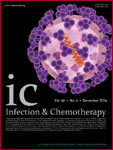
Infection and Chemotherapy
Advancing the Fight Against Infection and DiseaseInfection and Chemotherapy, an esteemed journal published by the Korean Society of Antimicrobial Therapy, focuses on the dynamic fields of infectious diseases and pharmacology. With an ISSN of 2093-2340 and an E-ISSN of 2092-6448, this peer-reviewed, open-access journal has been providing a crucial platform for research dissemination since 2008. Based in South Korea, it boasts a significant impact in the academic community, as evidenced by its Q2 ranking in both Infectious Diseases and Pharmacology categories for 2023. It holds a Scopus rank of 64 out of 272 in Pharmacology and 98 out of 344 in Infectious Diseases, showcasing its prominence and the quality of research it publishes. With a focus on advancing scientific knowledge, Infection and Chemotherapy is committed to fostering essential dialogues among researchers, clinicians, and students, making it a vital resource for those engaged in the fight against infectious diseases and the development of effective therapeutic protocols.

Annual Review of Virology
Advancing virology through comprehensive insights.Annual Review of Virology is a premier scholarly journal published by Annual Reviews, dedicated to advancing the field of virology through comprehensive and insightful reviews. Since its inception in 2014, this journal has established itself as a leading resource for researchers, professionals, and students alike, achieving an impressive Q1 ranking in the field of Virology and a Scopus rank of #10 out of 80 in its category, placing it in the 88th percentile. The journal features in-depth analyses of the latest developments in virology, encompassing various aspects such as viral pathogenesis, host interactions, and antiviral strategies, thereby catering to a diverse audience seeking the most relevant and cutting-edge information. Although it is not Open Access, Annual Review of Virology remains an indispensable tool for those engaged in virology research, transforming complex findings into accessible knowledge that shapes future investigations and practical applications in the field.
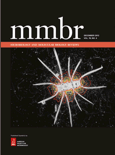
MICROBIOLOGY AND MOLECULAR BIOLOGY REVIEWS
Advancing the Frontiers of Microbial and Molecular ScienceMICROBIOLOGY AND MOLECULAR BIOLOGY REVIEWS, published by the American Society for Microbiology, is a premier journal dedicated to advancing the fields of microbiology and molecular biology. With an impressive impact factor reflective of its Q1 ranking in categories such as Immunology, Infectious Diseases, and Molecular Biology, this journal consistently showcases high-quality, peer-reviewed articles that contribute to the current understanding of microbial life and molecular mechanisms. Operating since 1997, the journal aims to bridge the gap between microbiological methods and molecular biology applications, making it an essential resource for researchers, professionals, and students alike. Readers can access content through various platforms, ensuring that the latest findings are readily available to the scientific community. With its esteemed reputation, MICROBIOLOGY AND MOLECULAR BIOLOGY REVIEWS remains a leading voice in the exploration of the life sciences, catering to a broad audience deeply invested in unraveling the complexities of microbial and molecular systems.
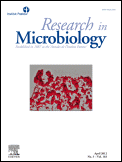
RESEARCH IN MICROBIOLOGY
Fostering innovation in microbiology for a global audience.Research in Microbiology, published by Elsevier, is a prominent academic journal devoted to advancing the field of microbiology, encompassing a diverse array of topics including immunology, molecular biology, and biochemistry. Established in 1987, the journal has expanded its focus over the years, with a commendable impact factor reflecting its relevance and influence in the scientific community. Although it does not currently offer open access options, Research in Microbiology remains a crucial resource for researchers and professionals seeking to stay abreast of the latest findings and methodologies. The journal holds a respectable Q2 ranking in Medicine (miscellaneous) and a Q3 ranking in both Microbiology and Molecular Biology for 2023, highlighting its position within the scholarly landscape. With its base in France and accessible to a global audience, Research in Microbiology continues to foster scholarly exchange, making it an essential platform for the dissemination of impactful microbiological research.

Microbiology Research
Charting New Pathways in Microbial ResearchMicrobiology Research, published by MDPI, stands as a pivotal open-access journal in the field of microbiology, having established its presence since 2010. Based in Switzerland, this journal strives to provide a platform for innovative research and cutting-edge findings in various branches of microbiology, including medical microbiology and molecular biology. With an impact factor that reflects its dedication to scholarly excellence, Microbiology Research is classified in the Q3 category for both microbiology and medical microbiology, and Q4 for molecular biology as of 2023, indicating its growing importance and outreach within these domains. The journal aims to foster discussion and collaboration among researchers, professionals, and students by presenting articles that cover a wide array of topics and methodologies in microbiological research. Leveraging its open-access model, Microbiology Research ensures that high-quality research is accessible to a global audience, thus facilitating the advancement of knowledge and innovation in the microbial sciences.
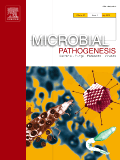
MICROBIAL PATHOGENESIS
Exploring Innovative Solutions in Infectious DiseasesMICROBIAL PATHOGENESIS, published by Academic Press Ltd - Elsevier Science Ltd, is a prominent journal in the fields of Infectious Diseases and Microbiology, with a notable impact factor and classified in the Q2 quartile for both categories as of 2023. Since its inception in 1986, this journal has provided a platform for the dissemination of cutting-edge research that enhances our understanding of microbial infections and their implications in health and disease. The journal is indexed in Scopus, ranking #80 among 344 in Infectious Diseases and #57 among 182 in Microbiology, underscoring its significant contribution to the scientific community. Although it operates under a traditional subscription model, the content is vital for researchers, professionals, and students focused on the dynamics of microbial pathogenesis and the development of innovative therapeutic strategies. The journal's comprehensive scope aims to foster advancements in this critical area of study, bridging the gap between laboratory research and clinical applications.

mSphere
Empowering breakthroughs in the world of microorganisms.mSphere is a leading open-access journal published by the American Society for Microbiology, dedicated to the dynamic fields of Microbiology and Molecular Biology. Since its inception in 2016, mSphere has rapidly established itself as a reputable source of scholarly research, achieving notable impact factors and excellence within the academic community. The journal ranks in the top quartile (Q1) amongst its peers in Microbiology, and Q2 in the field of Molecular Biology, demonstrating its significance and relevance through Scopus rankings—specifically, it holds the #42 spot out of 182 in the Microbiology category and #108 out of 410 in Molecular Biology. With an editorial commitment to advancing the understanding of microbial and molecular sciences, mSphere provides an accessible platform for researchers, professionals, and students alike to disseminate groundbreaking findings. The journal promotes rigorous peer-review and invites innovative contributions aimed at enhancing microbial research mobility and molecular exploration. Accessible openly since 2016, mSphere continues to thrive as an influential publication driving scientific dialogue and discovery in the microbiological sciences.

INDIAN JOURNAL OF MICROBIOLOGY
Innovating Solutions Through Microbial ResearchINDIAN JOURNAL OF MICROBIOLOGY, published by Springer, serves as a vital platform for the dissemination of cutting-edge research in the field of microbiology. With an ISSN of 0046-8991 and an E-ISSN of 0973-7715, this esteemed journal invites contributions that span various disciplines within microbiology, encompassing both fundamental studies and applied research that can impact health, environment, and industry. Recognized in the Q3 category in Microbiology for 2023, and ranking #80 out of 182 in Scopus’ Microbiology category, it reflects its commitment to quality and significance in the academic community. Authors and researchers benefit from the journal's comprehensive review process, which enhances the visibility and reach of their work. While no open access options are currently offered, the INDIAN JOURNAL OF MICROBIOLOGY remains a premier choice for those aiming to contribute to the ongoing dialogue in microbiological studies, ensuring that knowledge continues to evolve and thrive.
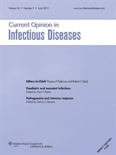
CURRENT OPINION IN INFECTIOUS DISEASES
Illuminating the Path Forward in Infectious Disease UnderstandingCURRENT OPINION IN INFECTIOUS DISEASES, published by Lippincott Williams & Wilkins, is a premier journal that focuses on the latest developments and understanding in the field of infectious diseases. With its ISSN 0951-7375 and E-ISSN 1473-6527, this journal has gained recognition for its pivotal role in advancing knowledge from 1988 to its current publications in 2024. Boasting an impressive Q1 ranking in both Infectious Diseases and the Medical Microbiology category, it holds a reputable position among the top journals in the field. The journal serves as an essential resource for researchers, professionals, and students alike, providing them with timely reviews, analyses, and perspectives that shape contemporary practice and policy. While lacking open access options, it ensures a critical examination of emerging trends and unique insights that foster informed discussions. With its consistently high impact factor, CURRENT OPINION IN INFECTIOUS DISEASES remains a vital platform for thought leaders and innovators navigating the complexities of infectious disease research.
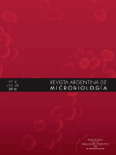
REVISTA ARGENTINA DE MICROBIOLOGIA
Advancing microbiological knowledge for a healthier tomorrow.REVISTA ARGENTINA DE MICROBIOLOGIA, published by the ASOCIACION ARGENTINA MICROBIOLOGIA, stands as a prominent open-access journal in the field of microbiology and medicine since its establishment in 1979. With an ISSN of 0325-7541 and an E-ISSN of 1851-7617, this journal has paved the way for disseminating high-quality research while enhancing accessibility for academics and practitioners worldwide. The journal has achieved notable rankings, being classified in Q3 for Medicine (miscellaneous) and Q3 for Medical Microbiology in 2023, reflecting its commitment to advancing knowledge in these critical areas. Despite its relatively modest impact factors, it occupies a vital niche in the academic landscape, fostering collaborations and innovative research among experts. With Open Access available since 2013, REVISTA ARGENTINA DE MICROBIOLOGIA not only facilitates widespread distribution of valuable scientific information but also empowers researchers, professionals, and students to stay abreast of the latest findings and developments in microbiology. For those engaged in the evolving realm of microbiology, this journal serves as an essential resource for sharing insights and advancing the scientific community.